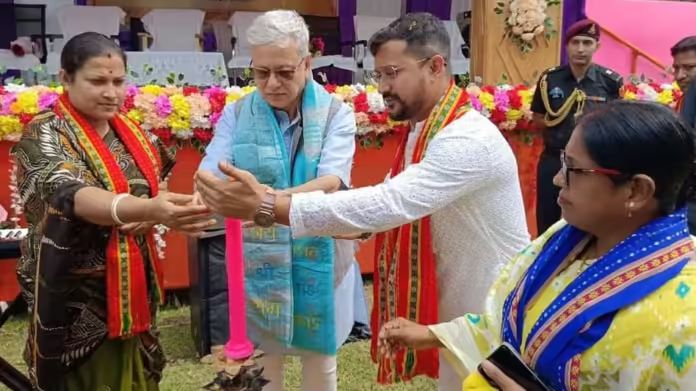Former Tripura Deputy Chief Minister, Jishnu Dev Varma, made a heartfelt appeal for the government and society to come together for the development of villages. Speaking at the Gram Diwas celebrations, he emphasized that the growth of rural India should be a shared responsibility, not only for politicians but for every individual in the country. According to him, the path to national progress starts from the grassroots, which is where the core of Indian society and culture lies. By visiting villages and understanding the challenges faced by rural communities, ministers, MLAs, and other key figures can gain the insight needed to uplift these regions effectively.
Dev Varma urged the ministers and MLAs to actively engage with the villagers, reminding them that the solutions to rural issues cannot be crafted in urban offices alone. He stressed that true development begins when the leaders of the country set foot in the villages, observe their needs, and develop policies that directly address those challenges. He reiterated that unless villages grow, the country’s development would remain incomplete. “We must not just talk about development,” he said, “but walk the talk by visiting rural areas, meeting the people there, and seeing what they lack firsthand.”
During the event, Dev Varma touched on the rich cultural traditions of India, particularly in its rural heartlands. He noted that the essence of Indian politics has been deeply intertwined with its traditional values. In his words, the culture of the villages is the soul of Indian politics, and the nation’s leadership must recognize the importance of preserving and promoting this cultural heritage. He believes that the traditions and values of rural India form the foundation upon which the country’s political landscape has been shaped.
He also spoke about how Gram Diwas itself represents the significance of villages in Indian life. It’s a celebration that reminds the people of the historical and cultural importance of rural India, something that is often overshadowed by the rapid urbanization that is taking place. This celebration, he noted, isn’t just about reflecting on the past but also looking forward, planning ways to integrate modern amenities into rural areas while maintaining their cultural identity.
Addressing the gathering, the former Deputy Chief Minister said that villages are not just places with fields and farms but are the foundation of the country’s economy and social fabric. “It’s from these villages that the country derives its strength,” he said. “Our farmers, artisans, and rural entrepreneurs are the backbone of the nation. Their prosperity is essential to our national prosperity. We cannot afford to ignore them.”
Dev Varma also highlighted that for villages to develop, society at large must take an interest in their wellbeing. This means not just depending on government initiatives but also inspiring local leaders, community members, and businesses to contribute to rural development. “If society and the government unite in their efforts, we can transform the face of rural India,” he remarked. He added that the private sector should play an active role in supporting sustainable growth in these regions, through corporate social responsibility initiatives and investments in rural infrastructure.
One of his key messages was the importance of sustainable development in villages. He emphasized that any development should not come at the cost of environmental degradation. Instead, he advocated for a balanced approach where modernization is introduced in a way that preserves the natural beauty and resources of rural areas. “We must adopt eco-friendly methods to ensure that the development we bring does not destroy the environment or the traditional ways of life that people in villages have been following for centuries,” he said.
Jishnu Dev Varma concluded his speech by calling on both the government and the public to work in harmony. He acknowledged that while the government has a critical role in providing infrastructure, policies, and support, societal involvement is crucial for the overall success of these efforts. “We must remember that real change starts at the grassroots level, and it is our responsibility as citizens of this great country to ensure that our villages are not left behind in the race for development,” he said.
His address during Gram Diwas served as a reminder of the pivotal role villages play in shaping India’s future. With proper attention and unity between the government and society, he believes that Indian villages can evolve into vibrant centers of economic, social, and cultural growth.


